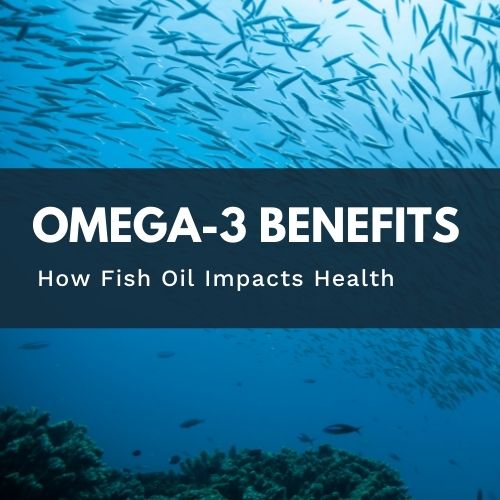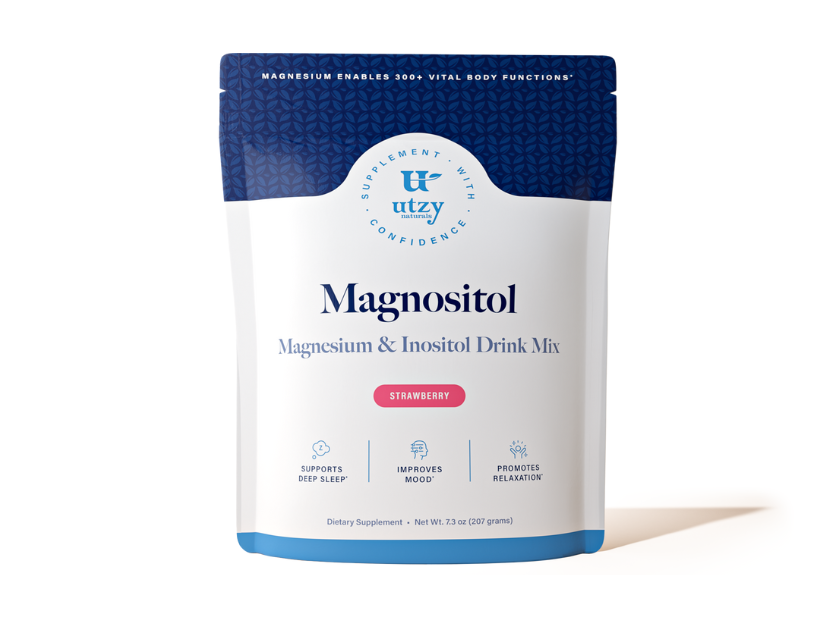shop
learn

The Health Benefits Of Fish Oil
March 12, 2023 5 min read
Eating wild-caught fish is one of the most beneficial foods that you can consume.
In particular, the oil from fish like trout, sardines, anchovy, mackerel, and salmon are loaded with fats that are essential for human health.
These fats are called “essential fatty acids” or EFAs.
Essential fatty acids are fats that your body isn’t able to produce on its own.
Since your body can’t create EFAs, you have to get them through diet.
What Are Omega-3s?
The most important essential fatty acids are called omega-3 fatty acids (or simply “omega-3s”).
The most commonly known two omega-3s are docosahexaenoic acid (DHA) and eicosapentaenoic acid (EPA).
To meet your minimum EFA needs, you need to eat fish at least once per week.
Many people dislike the process of cooking fish, or may not like the taste.
Because of this, taking a fish oil supplement is often the best way for many people to ensure that they’re getting enough essential fatty acids on a consistent basis.
Our bodies cannot make DHA and EPA, they are found almost exclusively in seafood.
However, our bodies use omega-3s for many things, including moving our muscles and growing new cells.
We’ll go over the main benefits of omega-3s below.
1. Inflammatory Balance
Inflammation is your body's way of recovering from an injury or an illness.
Inflammation is a normal process and is part of healing and recovery. However, sometimes, the body’s inflammatory response breaks down and becomes unbalanced.
Having adequate omega-3 levels can help to prevent this imbalance (1,2)
For those looking to support healthy inflammation levels in their body, supplementing with omega-3s is a great option.

2. Brain Health
Omega-3 fatty acids also play a critical role in normal brain function and development throughout all stages of life.
DHA and EPA, in particular, are vital for the maintenance of normal brain function.
These fatty acids are abundant in the cell membranes of brain cells, preserving cell membrane health and facilitating communication between brain cells (3).
Omega-3s have also been shown to help support brain health as you age (4)

3. Mood Support
Recently, there has been some interest in the potential links between Omega-3 fatty acids and mood (5,6).
Though scientists are still studying the mechanics of how it works, it appears that omega-3's ability to support inflammatory balance may also help improve your mood.
Studies have shown that people who consume more fish oil have better mental health and well-being (7).
One double-blind study showed that individuals who took fish oil had a significant improvement in mood as compared to a placebo (8).
Also, fish oil has been shown to have positive effects on age-related issues involving learning and memory.
Again, this is thought to be because of the health-supporting properties of fish oil.

4. Heart Health
Physicians and clinicians have been interested in the benefits of fish oil for over 70 years.
In the 1950s, scientists discovered that the Inuit People had lower incidents of heart problems, even though their diet contained high levels of fat and low levels of fruits and vegetables.
This finding sparked an interest in researching the heart-healthy benefits of fish oil.
The two long-chain fatty acids in fish oil (EPA and DHA) are a part of cell membranes throughout the body (9). These fatty acids have been shown to support overall heart health.
There have also been studies that show blood pressure support in people who take fish oil supplements (10).
How Safe is Fish Oil?
For people concerned about mercury in their fish, there is good news.
When you buy Utzy Naturals’ premium omega-3 fish oil, it is tested to be free of the contaminants and heavy metals that are often found in lower grade products.
Our fish oil is made in a pharmaceutical-grade facility where it is tested for over 250 different contaminants (including mercury and cadmium).
Not only that, our fish oil is in a natural triglyceride form.
The human body is accustomed to digesting and absorbing EPA and DHA in the natural triglyceride form. Even though natural triglyceride-based fish oils are the preferred form for fish oil absorption, the vast majority of fish oil products available on the market are in a semi-natural ethyl ester form.
While ethyl esters allow for higher concentrations of EPA and DHA to be achieved, their unusual structure is resistant to the digestive enzymes (lipases) that enable fat breakdown.
In a study comparing EPA and DHA digestion in both the natural triglyceride and ethyl ester form, five common digestive lipase enzymes were shown to more readily digest fish oil in the natural triglyceride as compared to the ethyl ester (11).
Additionally, a recent study, conducted by fish oil research pioneer Dr. Jorn Dyerberg, demonstrated that omega-3s in the triglyceride form are more efficiently digested and therefore 70% more absorbable than omega-3s in the ethyl ester form (12).
A high-quality fish oil will also be sourced from small fish such as anchovy and sardine. These small fish have shorter life spans so they do not accumulate the toxins that other, larger fish do.
At Utzy Naturals, we use high-concentration fish oil sourced from waters off the Chilean coast. As the world’s least industrialized coastline, these cold and unpolluted waters provide the cleanest, most sustainable source of fish in the world.
In Closing:
Fish oil has numerous health qualities, but as with most supplements, it pays to make sure you are getting the highest quality product.
Our fish oil comes from ethically sourced cold-water fish. You can feel confident that it is pure and free of contaminants.
Omega-3s are important for overall health, so make sure to support your body by buying the best.

References:
(1) n-3 polyunsaturated fatty acids, inflammation, and inflammatory diseases. https://www.ncbi.nlm.nih.gov/pubmed/16841861
(2) Marine omega-3 fatty acids and inflammatory processes: Effects, mechanisms and clinical relevance. https://www.ncbi.nlm.nih.gov/pubmed/25149823
(3) Dyall, S. C. (2015, April 21). Long-chain omega-3 fatty acids and the brain: a review of the independent and shared effects of EPA, DPA and DHA. Retrieved from https://www.ncbi.nlm.nih.gov/pmc/articles/PMC4404917/
(4) Long-chain omega-3 fatty acids and the brain https://www.ncbi.nlm.nih.gov/pmc/articles/PMC4404917/
(5) Inflammatory Proteins Predict Change in Depressive Symptoms in Male and Female Adolescents. https://www.ncbi.nlm.nih.gov/pubmed/31341724
(6) Inflammation fans the flames and feasts on the heat. https://www.ncbi.nlm.nih.gov/pubmed/26357876
(7) Omega-3 Fatty Acids Scientific Evidence and Biological Mechanisms. https://www.ncbi.nlm.nih.gov/pmc/articles/PMC5481805/
(8) Frangou, S., Lewis, M., & McCrone, P. (2006, January). Efficacy of ethyl-eicosapentaenoic acid: randomised double-blind placebo-controlled study. Retrieved from https://www.ncbi.nlm.nih.gov/pubmed/16388069
(8) Fish Oils, Coronary Heart Disease, and the Environment. Retrieved from https://www.ncbi.nlm.nih.gov/pmc/articles/PMC3780665/
(9) Fish oil supplementation: Evidence for health benefits. Retrieved from https://www.ncbi.nlm.nih.gov/pubmed/15055244
(10) Fish Oils, Coronary Heart Disease, and the Environment. https://www.ncbi.nlm.nih.gov/pmc/articles/PMC3780665/
(11) Yang, L. Y., Kuksis, A., & Myher, J. J. (1990, January). Lipolysis of menhaden oil triacylglycerols and the corresponding fatty acid alkyl esters... Retrieved from https://www.ncbi.nlm.nih.gov/pubmed/2313198
(12) Dyerberg, J., Madsen, P., Møller, J. M., Aardestrup, I., & Schmidt, E. B. (2010, September). Bioavailability of marine n-3 fatty acid formulations. Retrieved from https://www.ncbi.nlm.nih.gov/pubmed/20638827
Leave a comment
Comments will be approved before showing up.
Also in Health
Subscribe
Sign up to get the latest on sales, new releases and more …
Join the Utzy Naturals Club!
Sign up and get the latest on sales, new releases, and more...






